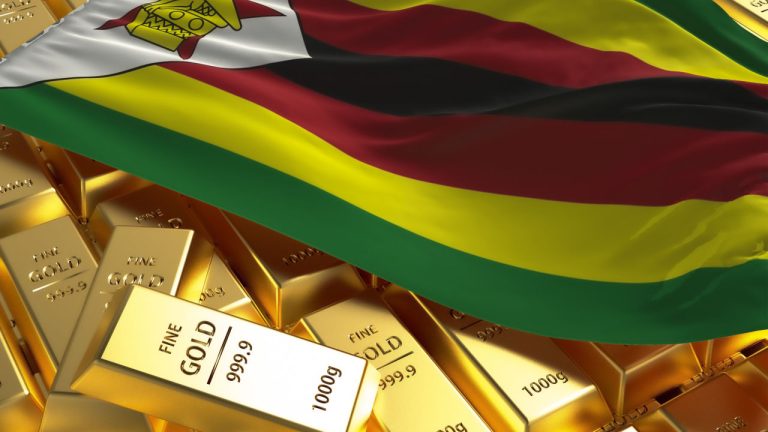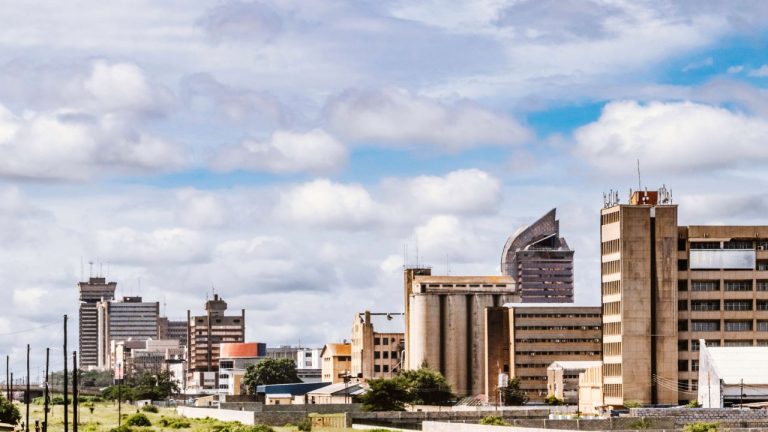 The governor of the Zimbabwean central bank, John Mangudya, recently revealed that his institution is planning to introduce a gold-backed digital currency. According to the governor, the soon-to-be-introduced gold-backed digital currency is expected to help diminish local residents’ demand for the U.S. dollar. Taming High Demand for the US Dollar The Zimbabwean central bank has […]
The governor of the Zimbabwean central bank, John Mangudya, recently revealed that his institution is planning to introduce a gold-backed digital currency. According to the governor, the soon-to-be-introduced gold-backed digital currency is expected to help diminish local residents’ demand for the U.S. dollar. Taming High Demand for the US Dollar The Zimbabwean central bank has […]
The Reserve Bank of Zimbabwe plans to introduce a gold-backed digital currency as legal tender in a bid to stabilize its local currency.
The Reserve Bank of Zimbabwe is set to introduce a gold-backed digital currency to serve as a legal tender in the country. The move is a government initiative to stabilize the local currency from its depreciation against the United States dollar.
According to a report from local media Sunday Mail, the move will allow small amounts of Zimbabwe dollars to be exchanged to the digital gold token, enabling more Zimbabweans to hedge against the currency volatility. Central bank governor John Mangudya said the plan intends to "leave no one and no place behind."
Zimbabwe's currency trades nearly Z$1,001 against $1 dollar, but is normally exchanged for Z$1,750 on the streets of Harare, the country's capital, according to Bloomberg. Zimbabwe's annual consumer price inflation reached one-year low in March at 87.6%, from 92% in February.

According to Mangudya, the exchange rate in the parallel market is expected to stabilize after tobacco farmers receive their United States dollar payments in the coming weeks. The authority said the current exchange rate volatility was caused by "expectations of increased foreign currency supply" on the market due to the tobacco season.
The monetary dysfunction in Zimbabwe led to a lack of small changes in the country, according to a Wall Street Journal report from March. Businesses have started printing their "own money", often on handwritten scraps of paper, so users can pay for future purchases.
Zimbabwe has been fighting against currency volatility and inflation for over a decade. In 2009, the country adopted the US dollar as its currency after an episode of hyperinflation. In 2019, the Zimbabwe dollar was reintroduced in an effort to revive the country's struggling economy. Last year, the government decided to use the US dollar again in a bid to curb surging prices in the country.
Crypto adoption has grown in many African countries as a result of the economic challenges. According to Chainalysis, the Middle East and North Africa region is the fastest growing region for crypto adoption in the world thanks to cross-border remittances, with over $566 billion in crypto transactions between July 2021 and June 2022, up 48% from the previous year.
Magazine: Bitcoin in Senegal: Why is this African country using BTC?

Nigerian crypto exchange Roqqu received the green light to operate in South Africa, providing on and off-ramps to South Africa's Rand currency.
Nigerian crypto exchange Roqqu has been granted regulatory approval to operate in South Africa, allowing users to purchase cryptocurrencies and withdraw funds with the country's fiat currency, the South African Rand, according to local media reports.
South Africa has been a top priority for Roqqu as the exchange seeks to expand its dominance in the African market. In a previous interview with Cointelegraph, the company ranked South Africa as a focal point for its growth plans, which includes reaching 5 million clients in 2023.
Roqqu has its sights set on Ghana, Uganda, Kenya, and Tanzania for regional expansion in the near future.
South Africa is one of the biggest crypto and blockchain adopting countries in Africa; and today, @roqqupay just received regulatory approval to operate in South Africa #RoqqucomingtoSA pic.twitter.com/D6rdiIkAFZ
— Roqqu (@roqqupay) April 20, 2023
Roqqu claimed to have over 1.4 million active customers as of January, when it also received a virtual currency license for the European Economic Area, effectively giving it the green light to operate in over 30 countries. It took two years for the exchange to receive permission from the region's regulatory authorities.
The exchange's strategy centers on facilitating cross-border transactions through cryptocurrencies, primarily to African countries. According to the Roqqu CEO Benjamin Onomor, "Africans who live and work in diaspora send over $5 billion yearly back home, they do so with so much stress and have to wait days in some cases before the funds get to their family members in Africa." He continued: "This is an issue as many families depend on this remittance for critical needs such as food and shelter."
Data from Chainalysis shows that the Middle East and North Africa is the fastest-growing region in the world for crypto adoption, transacting over $566 billion in cryptocurrencies between July 2021 and June 2022, up 48% from the previous year.
Cointelegraph recently reported that Africa's crypto-focused startups raised $474 million in funds last year, a 429% jump from the $90 million figure in 2021. The growth in capital flows surpassed the global average, which only saw a 4% increase in blockchain funding in 2022.
Magazine: Bitcoin in Senegal: Why is this African country using BTC?

Africa witnessed a 429% YoY increase in venture funding in 2022, with the majority of funding coming from Seychelles and South Africa.
The African continent continues to be a fertile ground for the growth and implementation of blockchain technology.
In the African Blockchain Report 2022 by Crypto Valley VC, it was stated that blockchain deals in Africa raised a total of $474 million, resulting in a 429% increase in African blockchain venture funding. This growth in funding for African blockchain ventures surpassed the global average, which only saw a 4% increase in blockchain funding.
According to the report, African blockchain funding demonstrated a growth rate that was over 12.5 times higher than that of general African venture funding on a year-on-year basis. Specifically, African blockchain ventures raised $474 million through 2022, reflecting a 429% increase in funding. In contrast, overall African venture funding saw a 34% increase, with $3.14 billion raised across 570 deals during the same period.
In 2022, African blockchain startups raised a total of $474 million, reflecting a 429% year-on-year increase compared to the $90 million raised in 2021. Africa experienced the highest growth rate in funding among all regions. Meanwhile, the US remained steady at $15.2 billion in funding, while Asia and Europe saw a year-on-year increase of 50% and 35%, respectively, with $4.74 billion and $4.88 billion in funding.

In the past year, Seychelles and South Africa were responsible for 81% of the blockchain venture funding in Africa, having raised $208 million and $177 million, respectively. Moreover, the number of African blockchain deals increased by 12% year-on-year, from 26 to 29.
African blockchain venture funding made up 1.77% of global blockchain venture funding, which saw an impressive 407% year-on-year increase, with several countries contributing to the surge. In comparison, the US concluded 137 deals, while Asia and Europe had 84 and 78, respectively.
Related: Web3 economy to gain more traction in Africa through DeFi-based financial inclusion
Nigeria is currently the frontrunner when it comes to the number of blockchain startups that have received funding, followed by South Africa, Seychelles, and Kenya. However, despite Nigeria having the highest number of deals in the continent in 2022, it only accounted for 3.4% of all African blockchain venture funding, with an average deal size of $1.25 million.
When taking into account the substantial increase in blockchain funding in Africa and the fact that there was a relatively small increase in the number of blockchain deals, it shows that the median deal size has significantly risen. This suggests that businesses are securing more substantial funding, and investors are becoming more confident in African blockchain ventures.
Magazine: Bitcoin in Senegal: Why is this African country using BTC?
 Zambia is set to complete real-life crypto usage simulations by the end of June, Felix Mutati, the country’s science and technology minister has said. The Zambian minister said his country is seeking a balance between innovation and consumer protection. Zambia Needs to Build Digital Infrastructure Before It Introduces Crypto According to the Zambian minister of […]
Zambia is set to complete real-life crypto usage simulations by the end of June, Felix Mutati, the country’s science and technology minister has said. The Zambian minister said his country is seeking a balance between innovation and consumer protection. Zambia Needs to Build Digital Infrastructure Before It Introduces Crypto According to the Zambian minister of […] Nigerian economic experts have said the country’s five-year-old currency swap agreement with China has not eased the pressure against the Nigerian currency. According to one expert, implementation of the swap arrangement is being held back by the size of the trade imbalance between Nigeria and China Easing Pressure on the Naira According to experts on […]
Nigerian economic experts have said the country’s five-year-old currency swap agreement with China has not eased the pressure against the Nigerian currency. According to one expert, implementation of the swap arrangement is being held back by the size of the trade imbalance between Nigeria and China Easing Pressure on the Naira According to experts on […] African users of the bitcoin gaming and payments app Zebedee will now be rewarded in the form of satoshis when they play games or when they listen to podcasts. In addition to being able to convert their rewards into local currencies, African users of the Zebedee app can use it to make cross-border payments. Converting […]
African users of the bitcoin gaming and payments app Zebedee will now be rewarded in the form of satoshis when they play games or when they listen to podcasts. In addition to being able to convert their rewards into local currencies, African users of the Zebedee app can use it to make cross-border payments. Converting […] The Nigerian crypto and Web3 startup Lazerpay announced on April 13 that it will cease operations. Co-founder and CEO Njoku Emmanuel said the decision to cease operations was made after Lazerpay failed to successfully close a funding round. The CEO also said he is ready to listen to offers from companies that may want to […]
The Nigerian crypto and Web3 startup Lazerpay announced on April 13 that it will cease operations. Co-founder and CEO Njoku Emmanuel said the decision to cease operations was made after Lazerpay failed to successfully close a funding round. The CEO also said he is ready to listen to offers from companies that may want to […]
DeFi-based financial inclusion serves to increase liquidity and earning opportunities for African micro-entrepreneurs through Fonbnk’s partnership with Tanda.
Web3 in Africa began with cryptocurrency, with blockchain technology bringing a lot of transformation regarding transparency and people’s control over their finances. The Web3 economy in Africa continues gaining traction with decentralized finance-based financial inclusion.
Fonbnk, the Web3 on-ramp that allows Africans to obtain cryptocurrency assets by exchanging their airtime credits, has partnered with Tanda, a merchant network platform in East Africa, to launch an airtime trading marketplace across Tanda’s network of agents.
The partnership between Tanda agents and vendors in East Africa can increase liquidity in the marketplace through the buying and selling of prepaid airtime for profit. This, in turn, can create opportunities for agents to earn revenue and also allow them to store their profits in dollarized stablecoins.
The partnership gives African micro-entrepreneurs more earning opportunities, creating a growth flywheel effect through improved liquidity and marketplace efficiency. This cycle builds trust and generates even more liquidity. Moreover, this partnership enables more African users to participate in the Web3 economy — without requiring bank accounts or cards — by using only their airtime credits.
Although Fonbnk operates throughout Africa, its partnership with Tanda is concentrated in East Africa. Fonbnk plans to expand earning opportunities for African micro-entrepreneurs and bring decentralized finance-based financial inclusion to the masses across Africa.
During the first episode of Cointelegraph’s Hashing It Out podcast, the co-founder of Fonbnk identified the rise in crypto adoption as being due to several factors, such as the chance to earn money, inflation, currency devaluation and the ease of doing business on a global scale.
Web3 can open up an intra-African exchange economy, and it can be used for purchases and transportation between African nations thanks to the ability to be used between borders. It will assist Africans in generating more economic value in the wider market.
Related: Bitcoin gaming enters Africa with local crypto exchange partnership
According to BitcoinAfrica.io, the top five African countries whose communities are adopting Web3 and crypto are South Africa, Nigeria, Zimbabwe, Kenya and Ghana. They have the most demand for digital currency and the most active local cryptocurrency communities.
Magazine: Web3 Gamer: Shrapnel wows at GDC, Undead Blocks hot take, Second Trip

According to Zambia Tech Minister Felix Mutati, the country needs digital identities and other necessary digital infrastructures before it introduces crypto.
Cryptocurrency regulation tests aiming to help shape crypto laws in Zambia that simulate the real-world use of crypto are on track to finish by June.
In an April 12 Reuters interview, Zambia’s innovation, science and technology minister, Felix Mutati, said the purpose of conducting the tests was to help the government “see what would happen in the real world,” to assist in forming crypto regulations.
Zambia’s central bank and securities regulator commenced the tests on Feb. 19, which Mutati said was looking to balance safety and innovation:
“Our main goal in the area of cryptocurrency is to strike a balance between innovation in terms of digital payments [...] against citizens’ safety, particularly given that cryptocurrency is very volatile.”
Additionally, Mutati stated that before cryptocurrencies can be introduced, digital identities and other digital infrastructures need to be implemented.
Related: Swedish Riksbank report looks at collaboration with potential e-krona in retail payments
Although Zambia’s debt restructuring process has been “long delayed,” with the largest portion of its debt owed to creditors from China, Mutati suggested it hasn’t deterred investment in Zambia.
“What we are seeing is increased appetite to invest in Zambia.”
Zambia was the first African country to default at the start of the COVID-19 pandemic in 2020. In a separate April 12 Reuters report, the country’s treasury secretary, Felix Nkulukusa, said thathe nation could lose the gains it achieved from its macroeconomic reforms if the debt restructuring is delayed further.
We continue engaging people on how we can achieve digital financial inclusion. pic.twitter.com/twoMnmI4BK
— Felix Chipota Mutati (@ChipotaFelix) April 6, 2023
When Mutati initially announced the country would be testing technology for crypto regulation on Feb. 19, he stated that “through digital payment platforms, people will become much more included in digital financial services.”
He added that “cryptocurrency will be a driver for financial inclusion and a change maker for Zambia’s economy.”
Many countries in the African region have made moves toward crypto adoption in recent times.
The Central African Republic made Bitcoin legal tender in April 2022, along with a regulatory framework for the use of cryptocurrency in the country.
It was reported on Dec. 18 that the Nigerian government plans to pass a new law in the near future that will recognize “cryptocurrency and other digital funds as capital for investment,” despite banning crypto activity in 2021.
Magazine: BTC white paper hidden on macOS, Binance loses AUS license and DOGE news: Hodler’s Digest, April 2-8